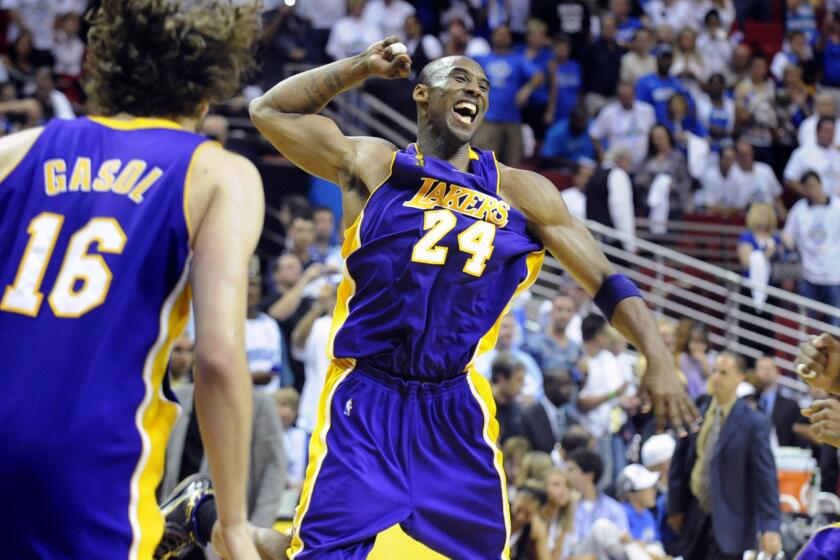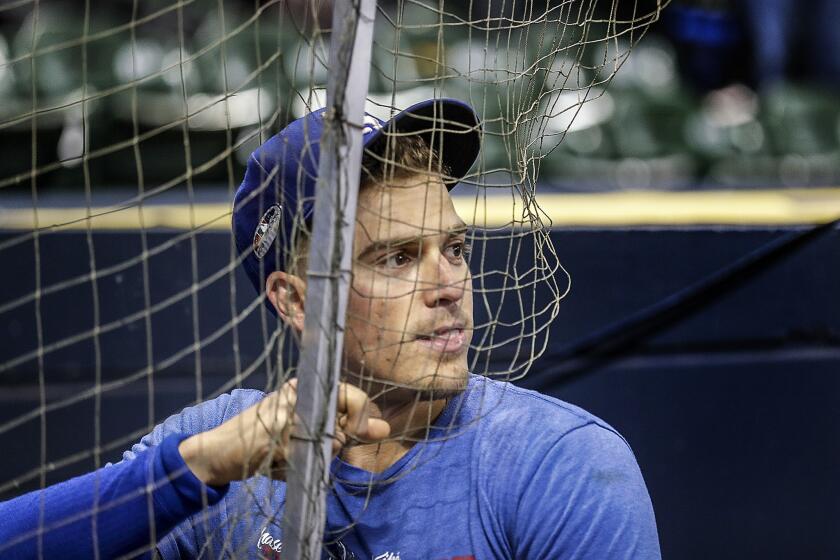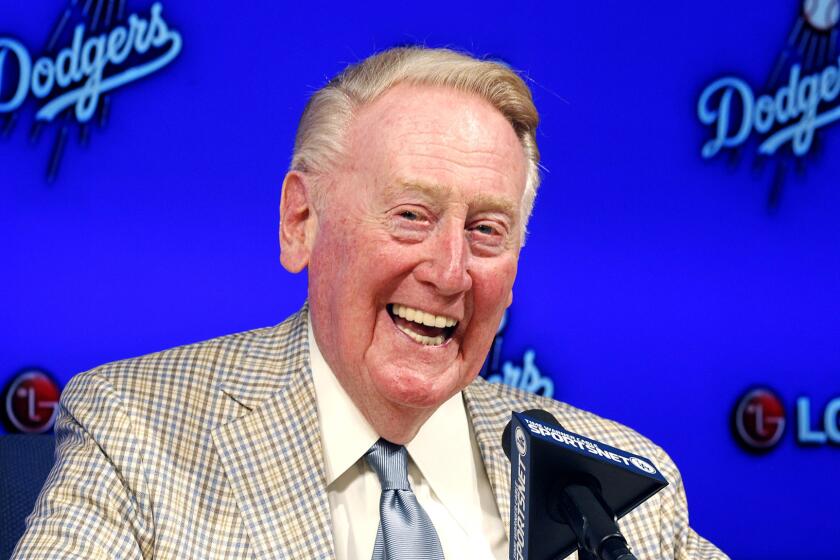Strange but true MLB contract perks range from hotel suites to gelatin sweets
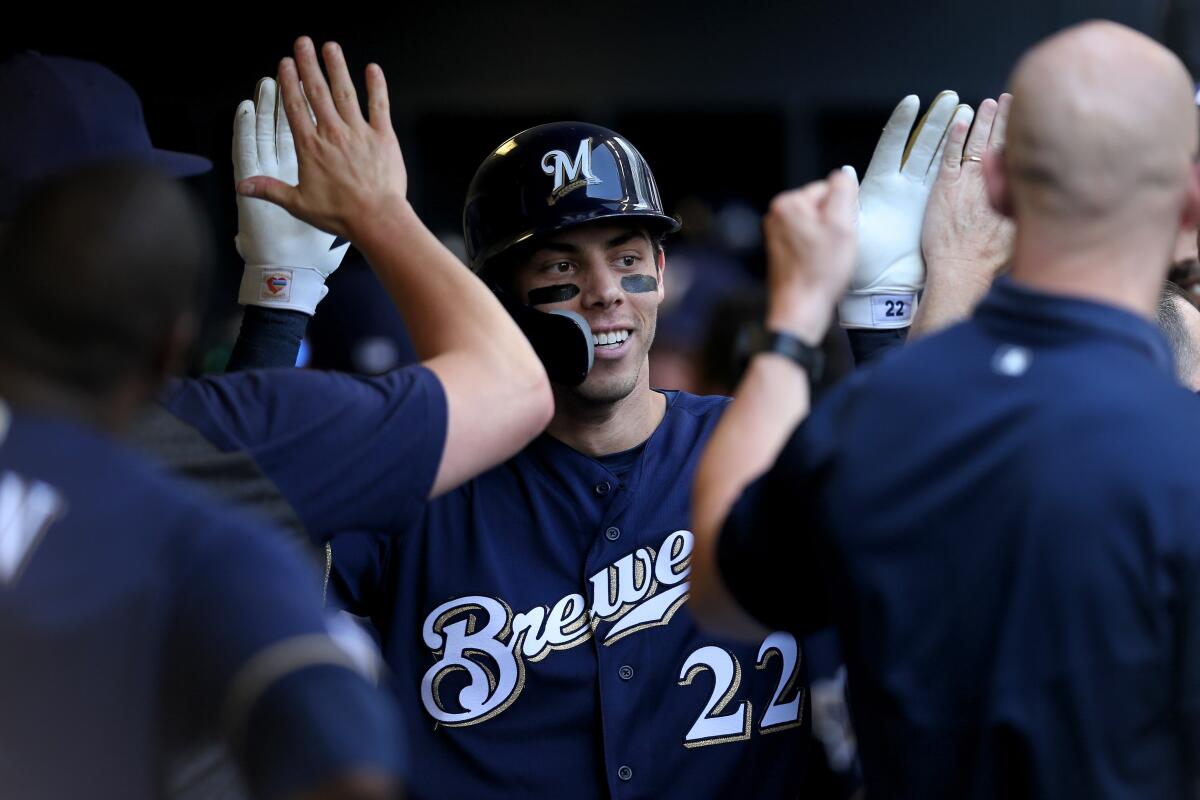
When Christian Yelich agreed to a contract extension with the Milwaukee Brewers in March, the deal guaranteed him at least $22 million a year through 2028, then $2.3 million a year through 2042, when heâll be 51.
Pretty good deal, right? But thatâs not all the former Westlake High outfielder will likely earn. The Brewers agreed to bonus clauses that would pay Yelich $50,000 for finishing third in voting for the National League MVP (he gets twice as much if he wins), $50,000 each for a variety of awards including a Silver Slugger or all-star selection, and $25,000 for a Gold Glove â all awards he has previously won.
Such incentives are nothing new in baseball, where the paychecks have become so big agents and teams often look for creative ways to reach agreements without simply adding zeroes to an already staggering figure. As a result, contracts can be as brief as a haiku or as complex as a novel, stuffed with deferred payments, no-trade clauses, performances awards, bonuses for passing a physical or avoiding injury, and other perks ranging from access to a private jet and suites on the road to college tuition and even Jell-O.
âThere are times where that could bridge the gap when youâre apart in terms of dollars,â said Gavin Kahn, a South Florida-based baseball and football agent who has negotiated contracts worth hundreds of millions of dollars over the past quarter-century. âItâs a way to sweeten the deal for the player and to provide some additional value for them to sign.
âIf thereâs an opportunity to include incentives [and] the player achieves those incentives, they should be paid additionally.â
Magic vs. Kobe? Wooden vs. Kareem? Vote in fourth round of âBiggest L.A. Sports Iconâ tournament
Who is the biggest icon in L.A. sports history? Readers get to decide.
Quirky contract language conceivably could complicate current negotiations between owners and the players union on pay if a shortened season is played this summer. However, several agents said that the March 26 agreement between owners and players spelled out that everything in contracts, including bonuses, would be prorated on the number of games played. If a player had a clause that pays him extra for 500 plate appearances, for example, heâd need 250 if the team plays 81 games.
But not all the pork packed into contracts is related to what happens on the field. Former Dodgers pitcher Kenta Maeda is contractually guaranteed uniform No. 18, which he took off the back of catcher Mitch Garver when he was traded to the Minnesota Twins in February. The eight-year contract Maeda originally signed with the Dodgers in 2016 also required the team to pay for four round-trip business-class airline tickets between Japan and the U.S. annually, an interpreter as well as travel, visa and housing expenses for a personal assistant.
Interpreters and support staff are popular incentives for players relocating from Japan. The Yankees gave pitcher Masahiro Tanaka a $35,000 moving allowance, a $100,000 housing allowance, an interpreter at a salary of $85,000 and four first-class round-trip airline tickets between Japan and New York â perks on top of his $22-million salary.
The Dodgersâ Clayton Kershaw and Justin Turner get up to $3 million each if theyâre traded, while Cubs pitcher Jon Lester gets 25 hours of private air travel each season. All three players bargained for those perks as free agents, status that gave their representatives plenty of room to negotiate.
âWhen a playerâs a free agent, clubs are trying to recruit him in addition to paying compensation. So a lot of it has to do with personal needs,â said agent Scott Boras, who pioneered many contract clauses that are common today. âOften this is about showing attention or affection for the conversations that took place in the negotiation process.â
When Boras negotiated baseballâs first $100-million contract in 1998, money wasnât even the deciding factor.
âWe thought the compensation was appropriate and another team was in that same area,â he remembered. âThe team asked me, âWhat can we do to get this done?â I said, âWell, the issue is geographical. His wifeâs going to visit him every weekend. And the reality of it is, the other team is about two hours closer.â â
So the team agreed to pay for 12 charter flights from Georgia to Los Angeles, and pitcher Kevin Brown signed with the Dodgers instead of the Colorado Rockies.
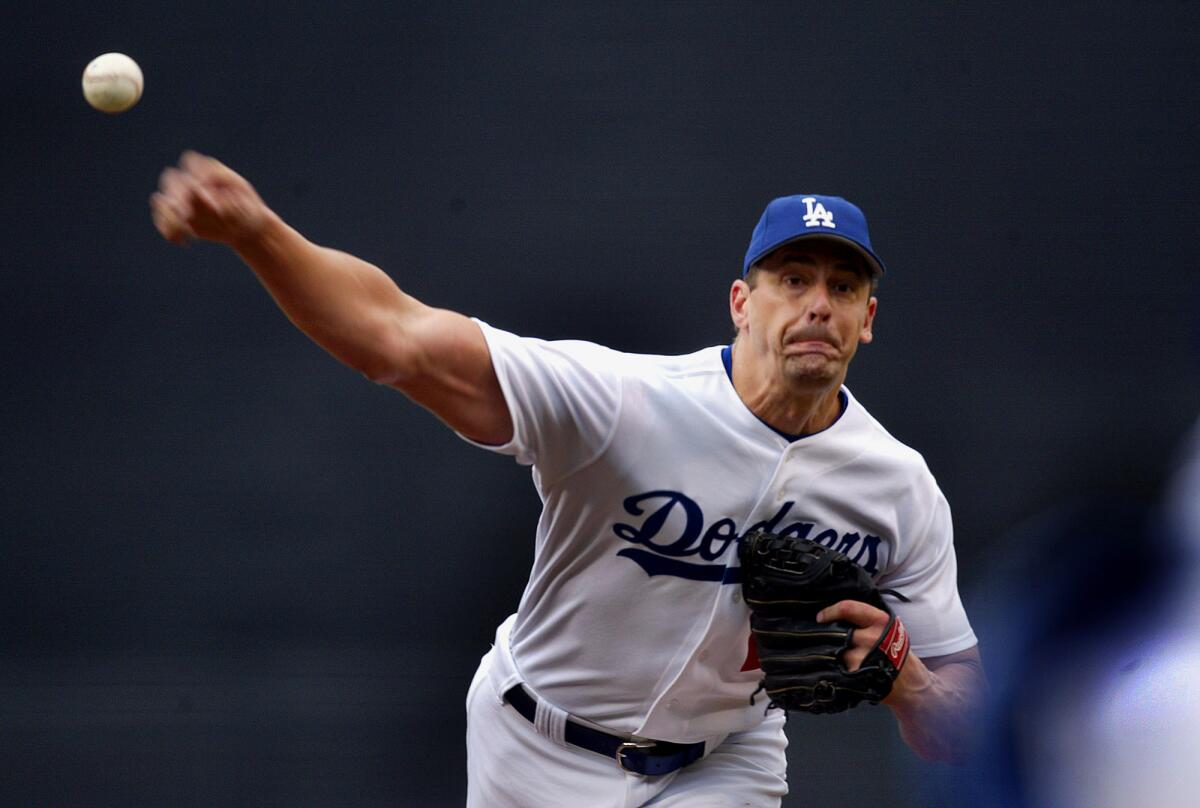
For some players, itâs more about give than take. The Yankeesâ Giancarlo Stanton and the Redsâ Mike Moustakas, for example, are contractually obligated to donate 1% of their salaries to team charities. Boras has also negotiated clauses that allow his clients access to the stadium and use of the teamâs logo for charitable events.
Others prefer the suite life. When Bryce Harper signed with the Philadelphia Phillies before last season, his contract not only paid him $330 million and the opportunity to earn an additional $800,000 annually in award bonuses, but it guaranteed a hotel suite on the road and the right to purchase a luxury suite for home games.
Nine years earlier, when Harper left junior college to sign his first contract with the Washington Nationals, the team agreed to pay for eight semesters of college, something Kahn said is a common perk.
Contract perks often wind up helping both the team and the player. When pitcher Hyun-Jin Ryu re-signed with the Dodgers before last season, Boras negotiated a clause that allowed Ryuâs personal trainer access to the clubhouse. Ryu responded with an All-Star season, leading the National League with a 2.32 ERA and throwing more innings than he had since his rookie season in 2013.
Dodgers starter Alex Wood has a bonus clause that could nearly double his $4-million salary depending how often he records at least 10 outs in a game. And Max Muncy, who made little more than the major league minimum $555,000 last season, signed a three-year, $26-million deal this winter that includes a clause that would pay him another $250,000 every year he finishes in the top 20 in voting for the NL MVP award.
Some clauses are specific to individual teams. When Stanton left the Miami Marlins for the New York Yankees and Evan Longoria moved from Tampa Bay to the San Francisco Giants, both left Florida, which has no state income tax, for states with income tax rates above 8%.
Over the life of his contract, the trade could cost Stanton $13 million. So agents now ask teams in Texas, Florida and Washington, which have no state income tax, to either make up the difference or allow them to opt out of a contract if they trade their clients to states with high tax rates.
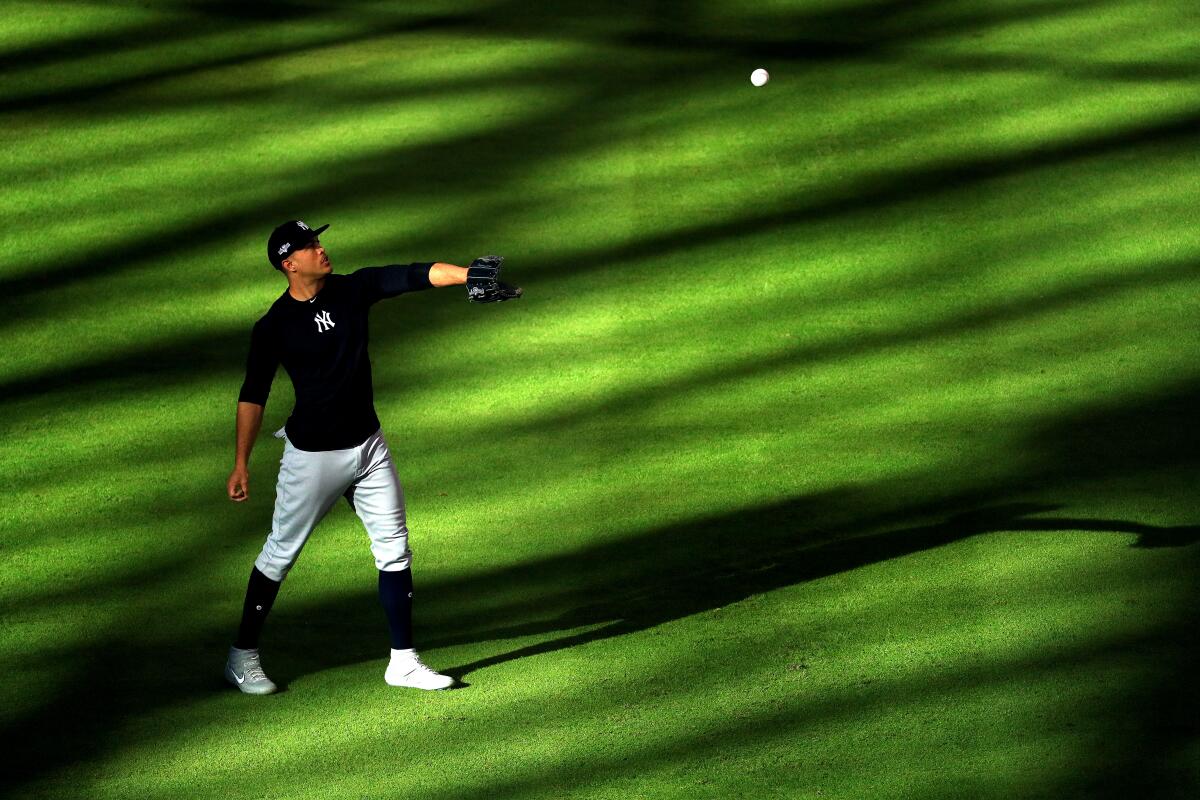
âItâs only fair to the players to be able to negotiate an adjustment in the event that the player is traded,â Kahn said.
Some teams, like the Angels under general manager Billy Eppler, try to steer clear of incentives and perks altogether, though Eppler made exceptions for highly paid stars Mike Trout and Anthony Rendon.
Trout gets a hotel suite on the road and use of a luxury suite for home games through 2030. Rendon can add an extra $525,000 to his $25.5-million salary if he is voted MVP of both the World Series and American League Championship Series and is named a starter in the All-Star game. Angels veteran Albert Pujols is contractually guaranteed the use of a luxury suite at Angel Stadium for 10 games each season for his foundation.
Arizona Diamondbacks President Derrick Hall said he rarely offers a perk in contract talks. Yet this winter the team gave free-agent pitcher Madison Bumgarner a suite on the road. The Diamondbacks also promised bonuses to infielder Nick Ahmed and outfielder David Peralta if they spent 150 days on the active roster in either of the next two seasons.
âThere are certain teams that, as a policy, will do certain incentives. And there are some who [do] not,â Kahn said.
Dodgers utility man KikĂŠ HernĂĄndez is eager to play because heâll be a free agent this winter, but heâs having fun staying busy with his wife, Mariana.
What teams canât do is offer incentives based on performance, such as hitting a certain number of home runs or striking out a certain number of hitters.
âSuppose your brotherâs pitching and [youâre] hitting and you need one home run to make $50 million extra or whatever,â Boras said. âYou obviously donât want that.â
But bonuses for winning awards such as a batting title or finishing in high in the MVP voting are common.
Other clauses seem more like inside jokes than attempts at serious rewards.
Reliever J.C. Romero, who had four at-bats in a 14-year career that ended in 2012, had a clause in his contract with the Phillies that would have paid him $50,000 for being the NLâs best-hitting pitcher. And pitcher Charlie Kerfeldâs second big league contract guaranteed him 37 boxes of orange Jell-O to match the No. 37 on his orange Houston Astrosâ jersey.
Still other contracts included bonuses for winning MVP of the Division Series. There is no Division Series MVP.
âA lot of it comes down to leverage in terms of the player and the willingness on the part of the teams to provide certain incentives for players to sign when theyâre free agents,â Kahn said.
Sometimes all that takes is a sense of humor and a case of Jell-O.
Vin Scully, 92, has been released from Los Robles Hospital following a fall Tuesday at his home, according to a Dodgers team statement Saturday.
More to Read
Go beyond the scoreboard
Get the latest on L.A.'s teams in the daily Sports Report newsletter.
You may occasionally receive promotional content from the Los Angeles Times.

